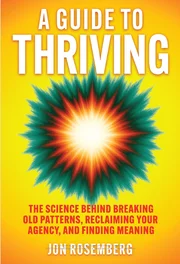The author opens the book with a series of devastating events that occurred to people in the author’s inner circle that made him realize that “life can be more than mere survival.” Survival mode, he writes, is an “emergency response system” that may manifest as irritability, procrastination, or simply becoming numb. By contrast, thriving is characterized by feeling “open, energized, flexible, and deeply connected.” Creativity and curiosity are other hallmarks of the latter. Rosemberg introduces a map of nine interconnected elements—beliefs; thoughts; emotions; sensations and actions; transcendence; the past; the present; the future; and space—that can help readers shift from surviving to thriving. He explores each in depth and invites readers to go deeper into each one by using his AIR (“Awareness, Inquiry, and Reframing”) framework. The book also discusses ways to face emotional challenges, interpret bodily sensations, adopt an optimistic explanatory style, and balance hedonia (the pursuit of pleasure and happiness) with eudaimonia (the pursuit of purpose and meaning). The book also explores the power of objects, spaces, systems, and culture. Case studies from Rosemberg’s coaching clients highlight how agency, mindfulness, prospection, and space affect one’s ability to thrive. The book concludes with a reminder that learning from challenges, rather than being defined by them, is essential to living life to the fullest. Rosemberg creatively combines personal history, professional anecdotes, neuroscience, and psychology in this all-compassing life-improvement guide. Anecdotes from the author’s coaching clients sometimes feel a bit too polished, presenting a process of transformation that seems smoother than it often is. However, his experience with depression, anxiety, and upheaval lends gravitas to such statements as “Transitions in life often feel disorienting and heavy, like wading through thick mud. The harder we fight against it, the deeper we sink.” Rosemberg compassionately acknowledges the role of privilege in well-being, noting that “Systemic decisions give some people easy access to thriving while leaving others to struggle.”
Categories
A GUIDE TO THRIVING
